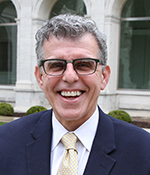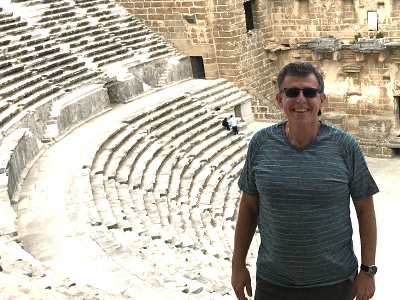May 2017

David Gozal, MD, MBA
I hope that by now all of you have blocked your schedules, coordinated your back-ups at home, and registered to attend the International Conference in DC. If you did not, you will miss out on a spectacular scientific, clinical, advocacy and social program, one for the history books! You clearly cannot afford to confess to your colleagues that you missed it!
The 365 days of ATS presidency have gone by really fast, and it is time for me to reflect on what has transpired over this period before I transfer the gavel to my distinguished colleague, and first and foremost dear friend, Marc Moss. As part of such an introspective process, I would like to focus on the reasons and experience of obtaining an MBA while serving on the ATS Executive Committee, before I assumed my current role in the Society.
Some of you will immediately label the decision as an act of insanity. But, before you reach such diagnosis as your final one, please bear with me. First, please think of the ATS as a global professional society with various interests in different “markets” that require a deep understanding of culture and opportunity. As one of my professors in business school repeatedly iterated: Think global and act local.
To formulate and implement a solid fiscal policy, sustainable strategy, and maintain competitive advantage, the marketing, logistics, and supply chain infrastructures of the ATS need to be refined. Developing or fostering alliances and partnerships, and understanding barriers to implementation are also of consequence. Sound like a business exercise? Well, if it does it is because it really is. The ATS is a matrix organization with a complex set of operational targets. How do you best serve and promote this century-old vibrant Society and help it in reimagining its future identity?
As a medical student, I sought to gain the knowledge of medical practice and acquire skills in the art of medicine. Jump forward to the present, and the self-oriented career takes a progressive and definitive turn toward the next generation—training those who will keep innovations coming, who will carry the banner and inspire those after them. At no time was the business of medicine omnipresent in any of my earlier career decisions. And yet, it became evident slowly and inexorably.
In parallel with the ever accelerating technological advances and breakthroughs in almost every discipline, clinical medicine underwent a huge and nearly silent transformation. From mission-driven, individual altruistic motivation, we transitioned to the realization that the practice of medicine had evolved to become an industry, the health care industry.
In that process, to varying degrees, we lost our independence, our autonomy, our ability to decide on the best course of action on behalf of our patients. We were—and continue to be—imposed with prescriptive approaches that obey market forces, and thus have surrendered our art for the sake of production. Disheartening? Perhaps. But successful businesses see opportunity even when disaster looms.
The fundamental importance of understanding the business of medicine dawned on me relatively late in the game. As my career became increasingly consumed by administrative roles, what some refer to as the “price for success,” delegating key decisions of my practice to the business professionals was taxing my sanity. How could well-intentioned administrators properly weigh the complexities of medical decisions that had taken me a lifetime to acquire, and reconcile them with the fiscal imperatives of sustainable business practices and competitive advantage? What was it that they knew that I did not? If they could aspire to such laudable goals, then so could I. To enable a dialogue, I needed to learn the language and tools of the trade, understand its principles and drivers, and eventually become proficient at analyzing and dissecting scenarios with that same framework. I needed to go back to school!
If anyone says it is easy to become again a student, they are citing “alternative facts!” I was motivated by an ardent desire to serve in my best capacity, and I used this unique opportunity as the impetus for self-improvement and investment in my future professional life. The return on investment was clear. The global MBA marathon was on, and with it, a personal journey of learning, doing, and converting dreams into realities.

“The past guides our future” –David Gozal MD, MBA, at
Aspendos Roman auditorium in Antalya,Turkey during the
Turkish Thoracic Society Meeting in April 2017.
If you find yourself in a similar situation, or aspire to make greater contributions and be an advocate for our profession, if you wish to take on a pro-active role in defining the industry, if you believe that success and progress are not only the fruit of very hard labor but also of a sound strategy and business acumen, then you may wish to consider applying to business school.
Thank you, ATS members, for entrusting me with the challenge of being your president, for pushing me to better myself, in the process of serving and working for you. You have been the catalyst for my leadership transformation, and for that I am indebted.

